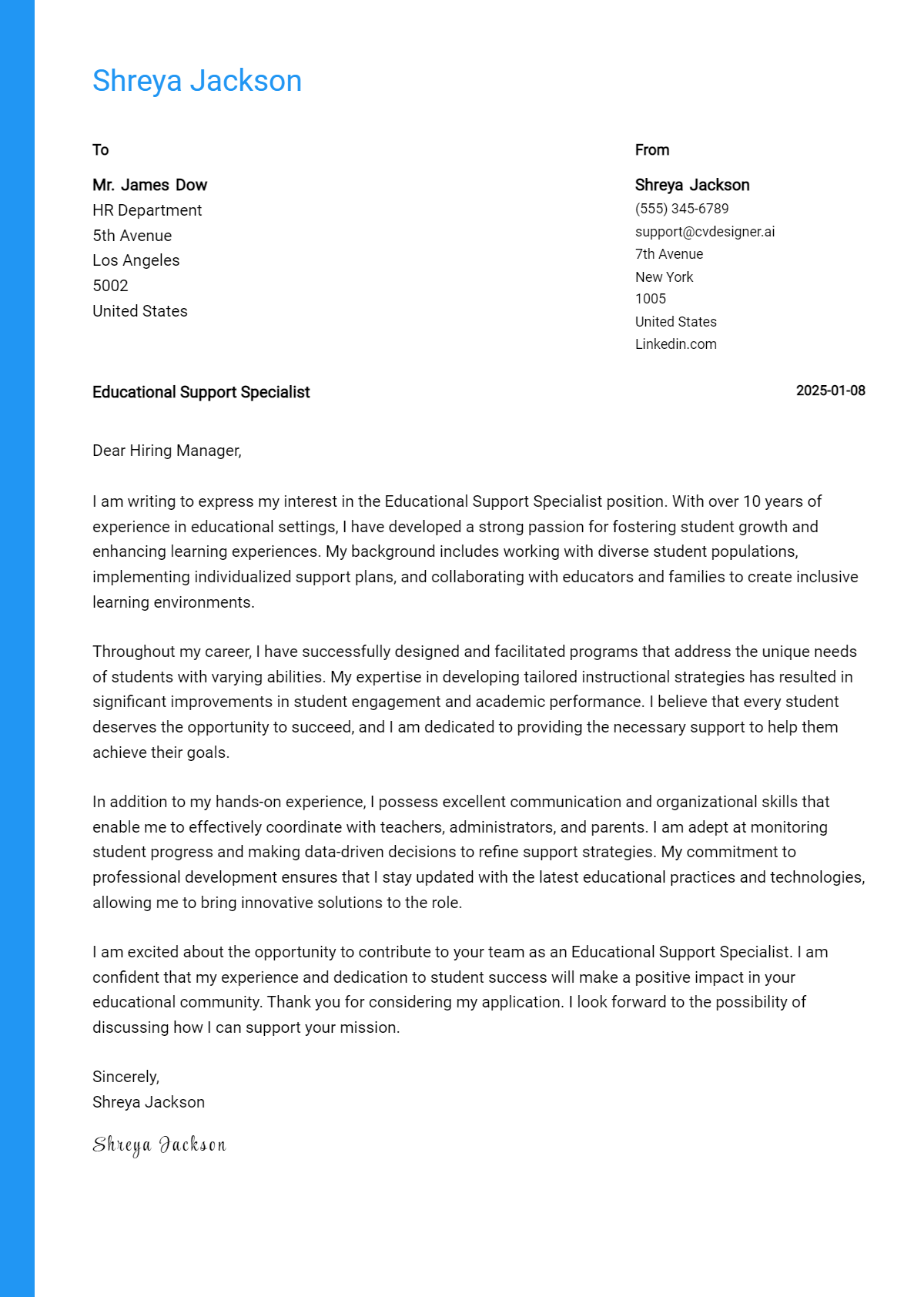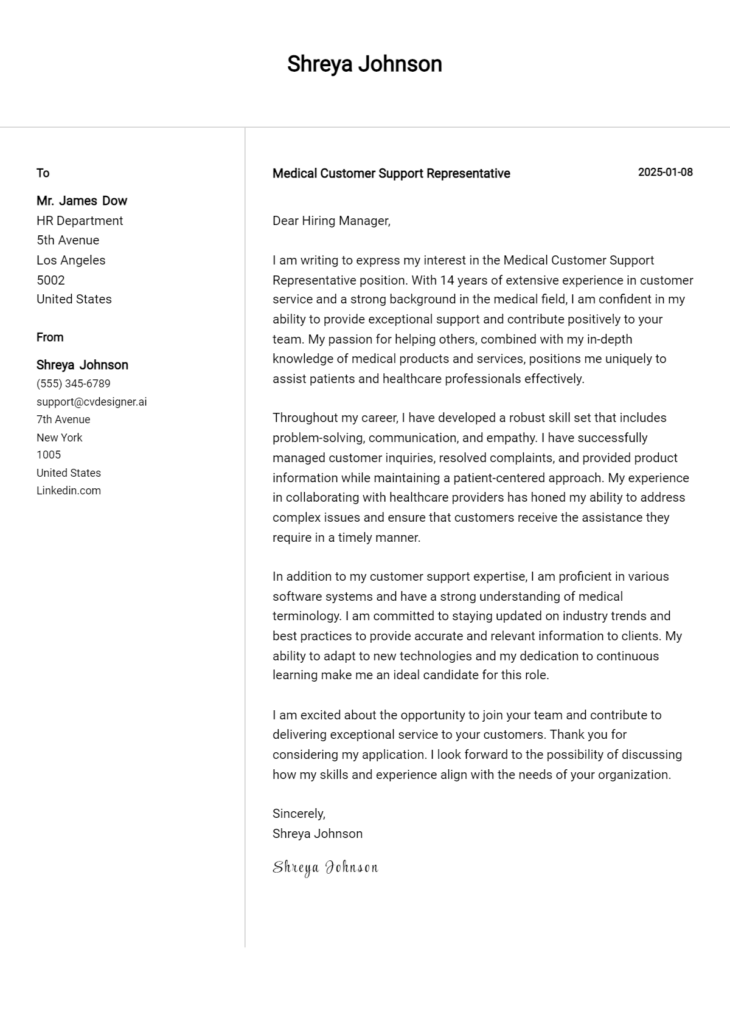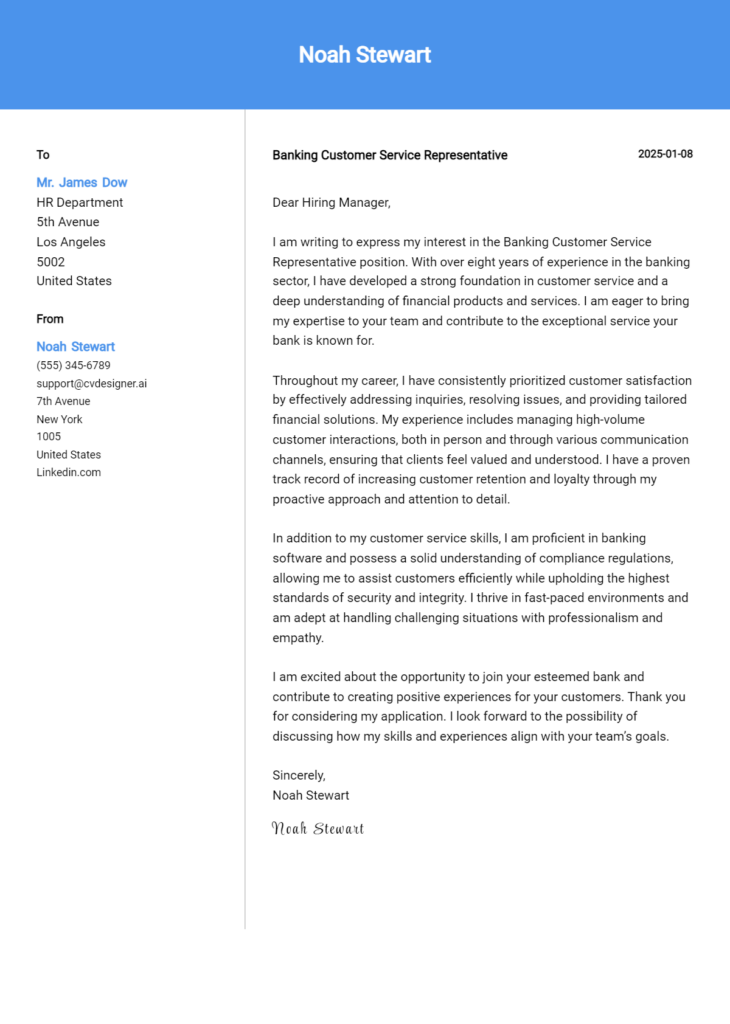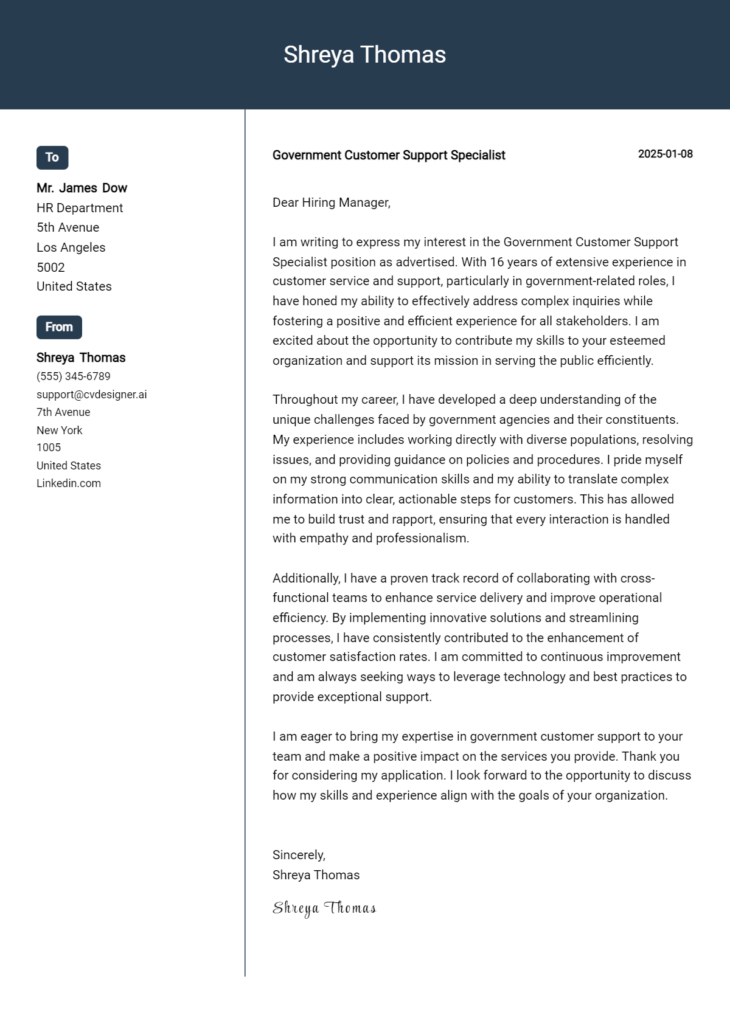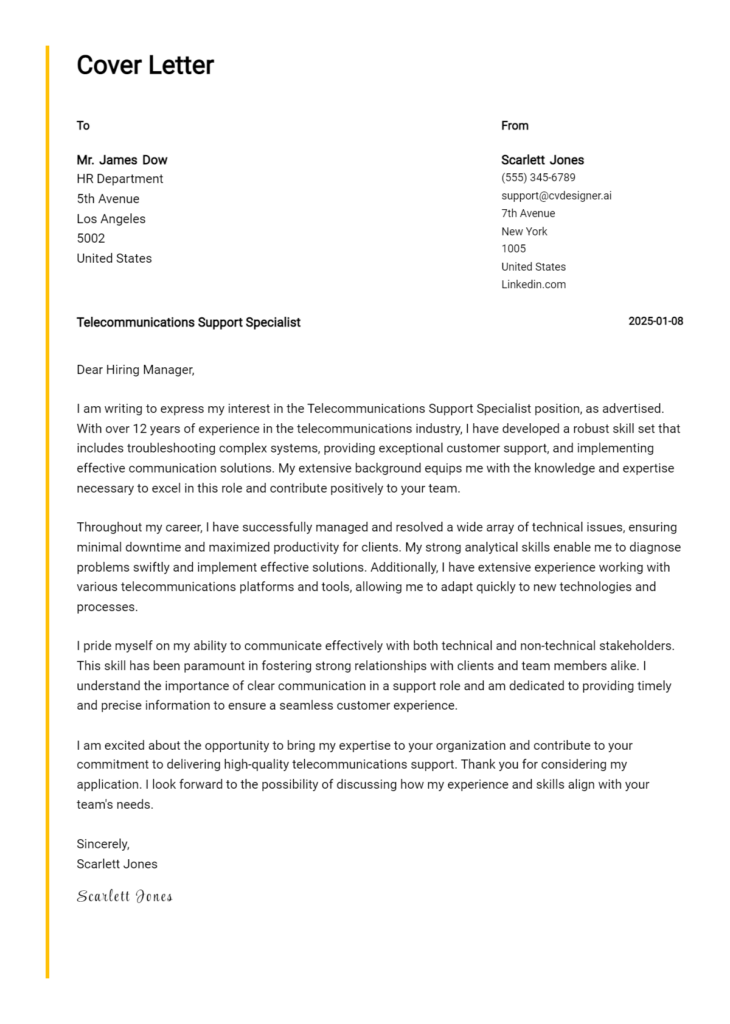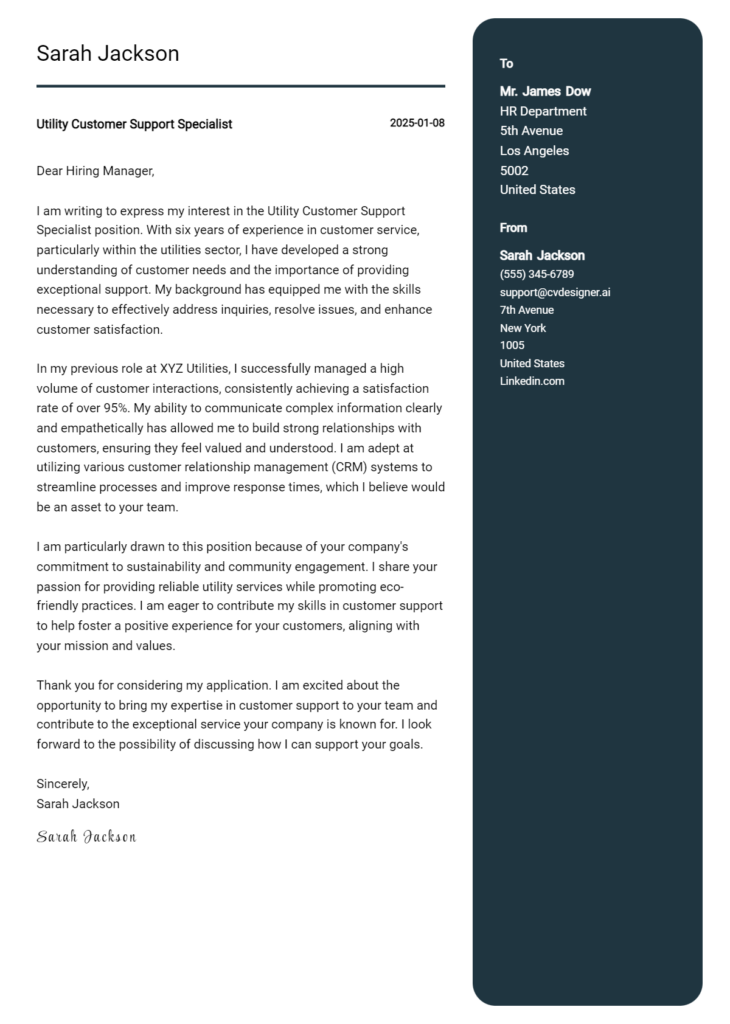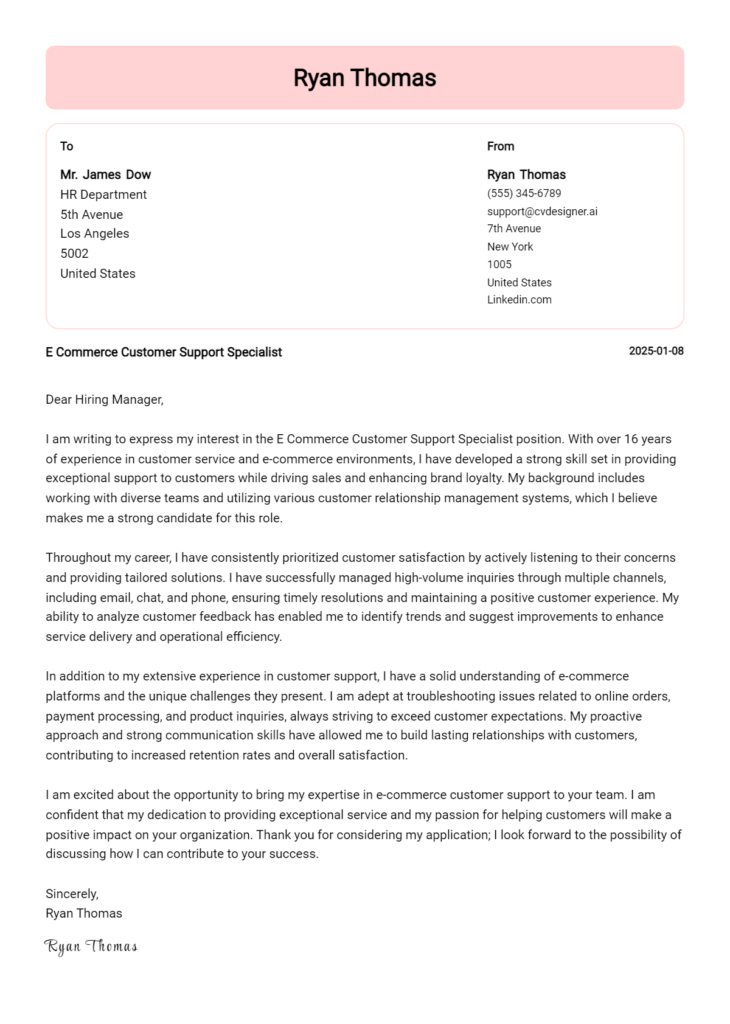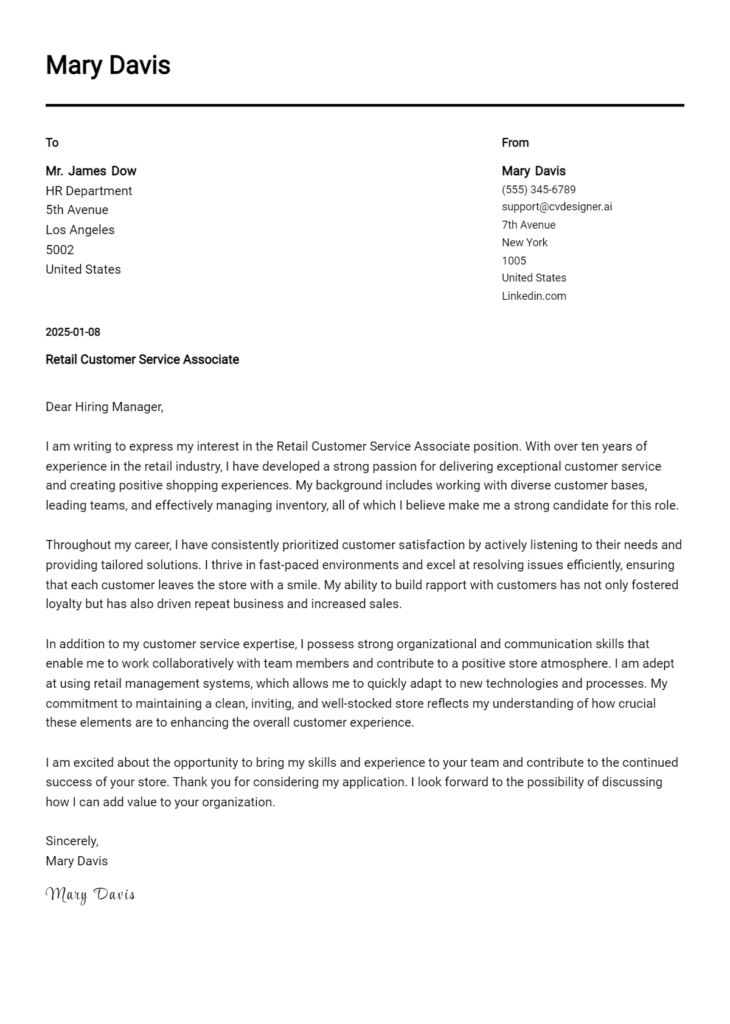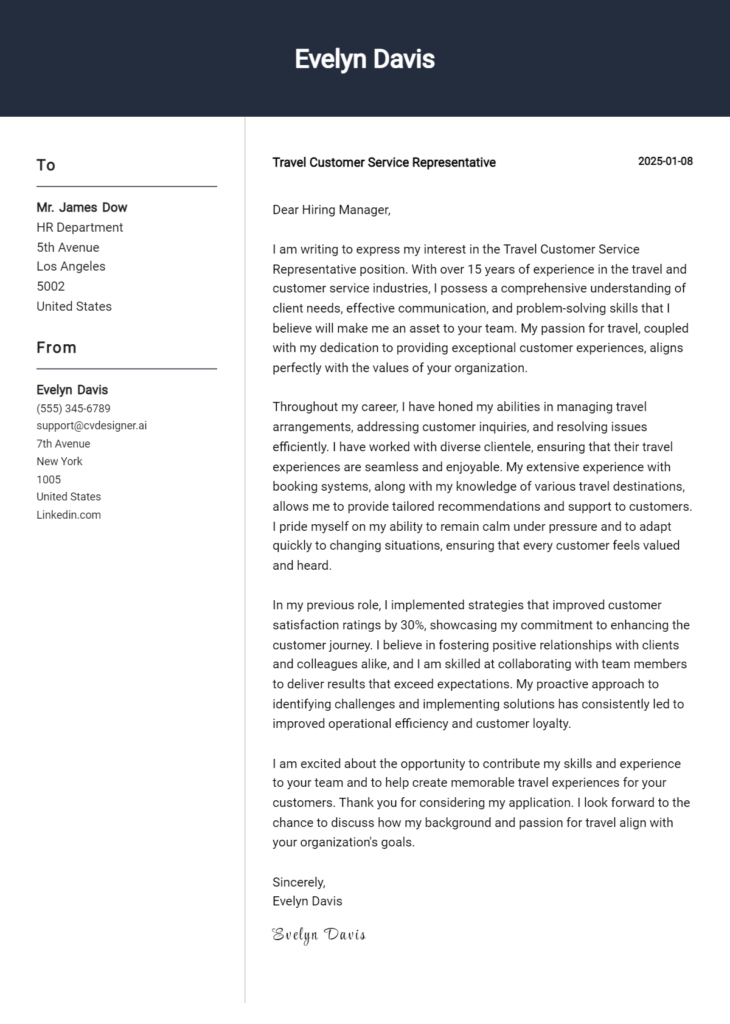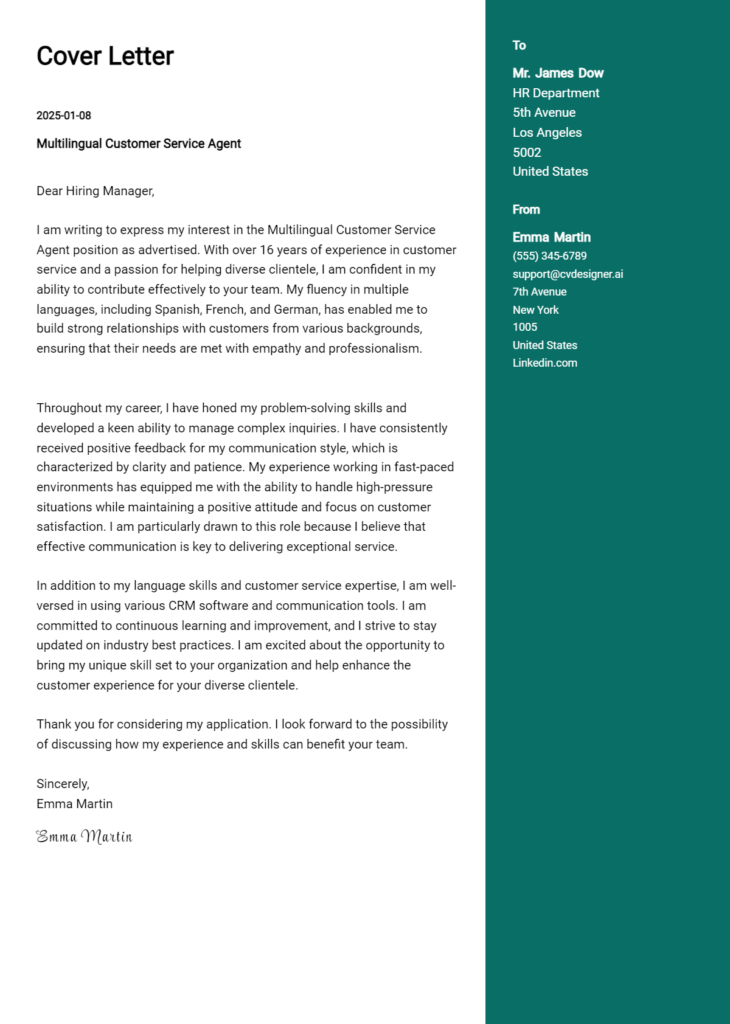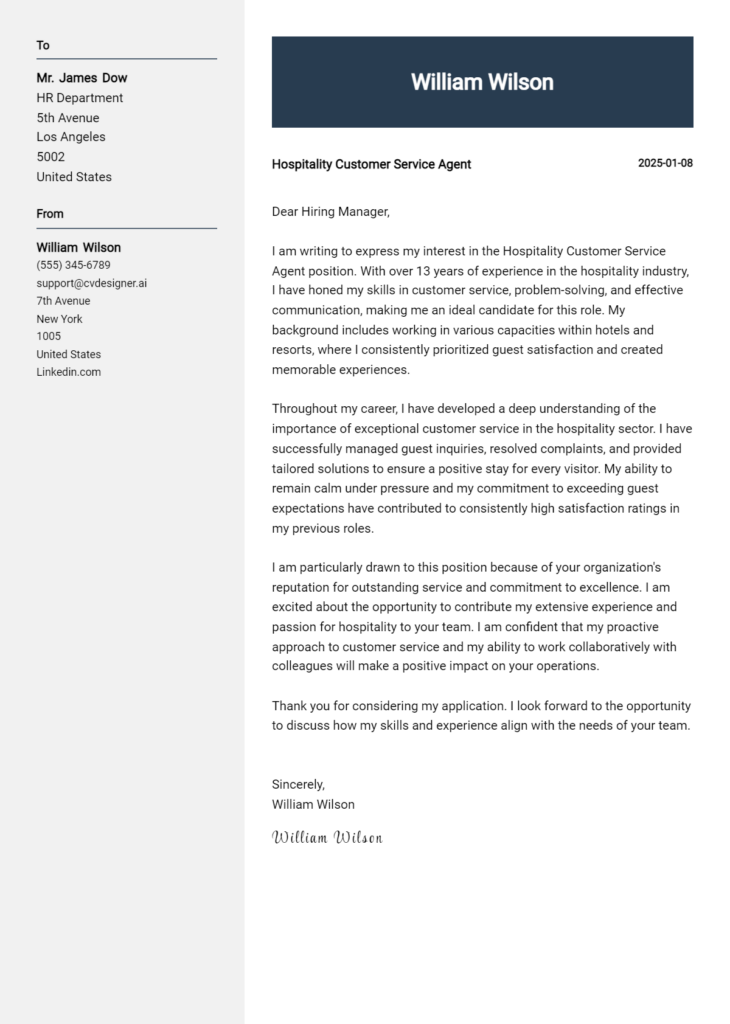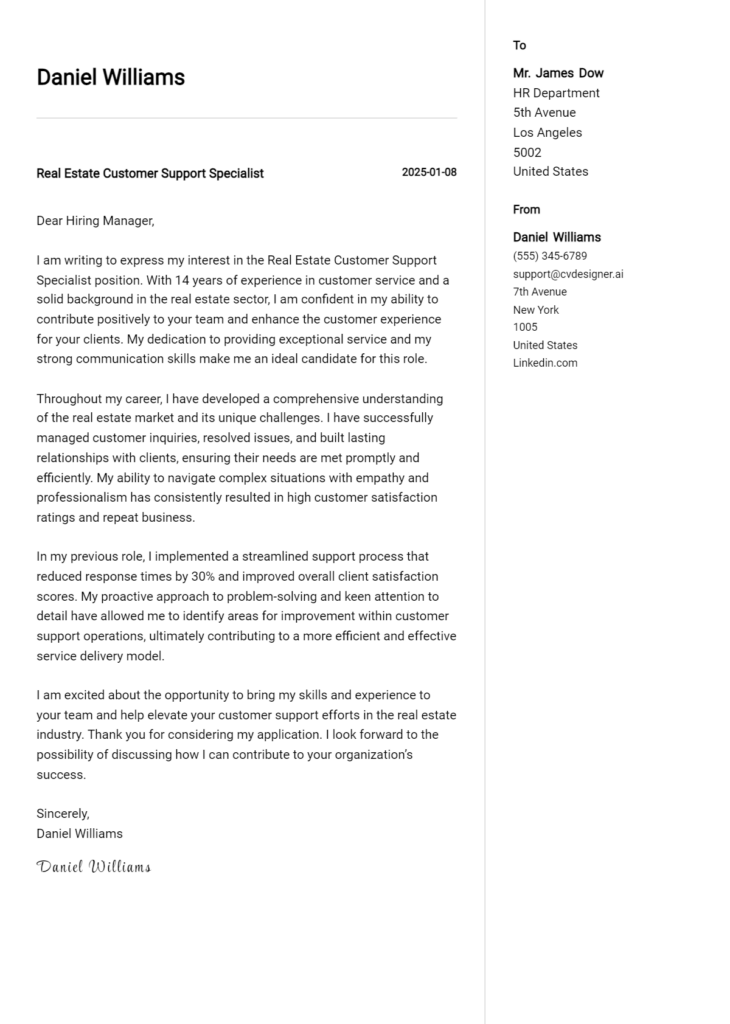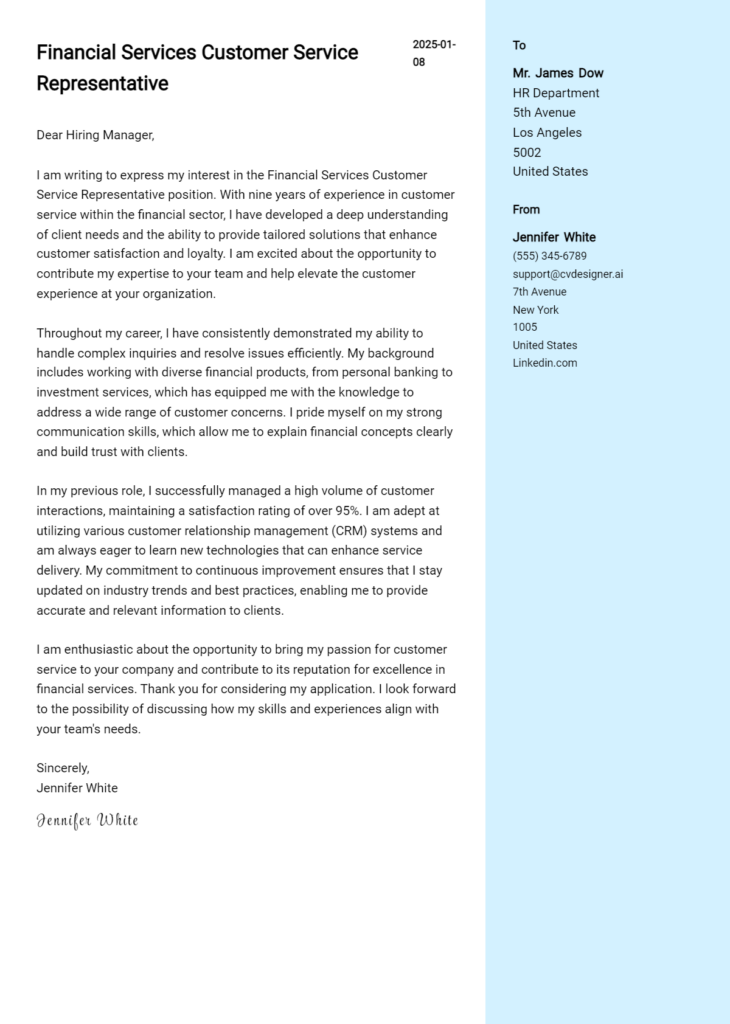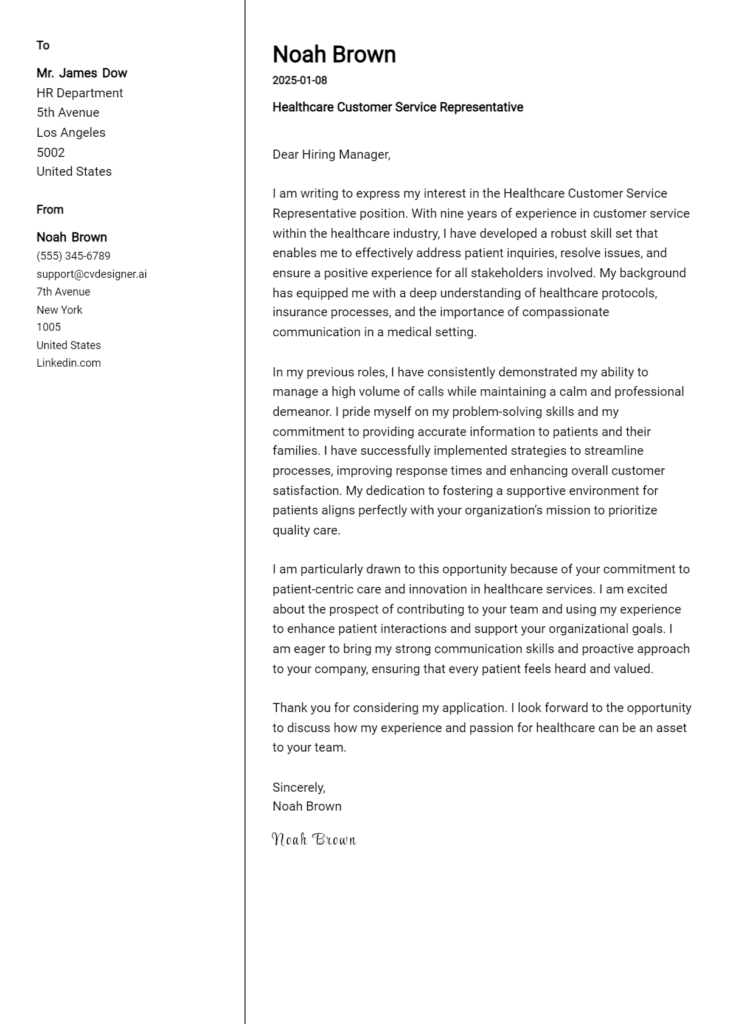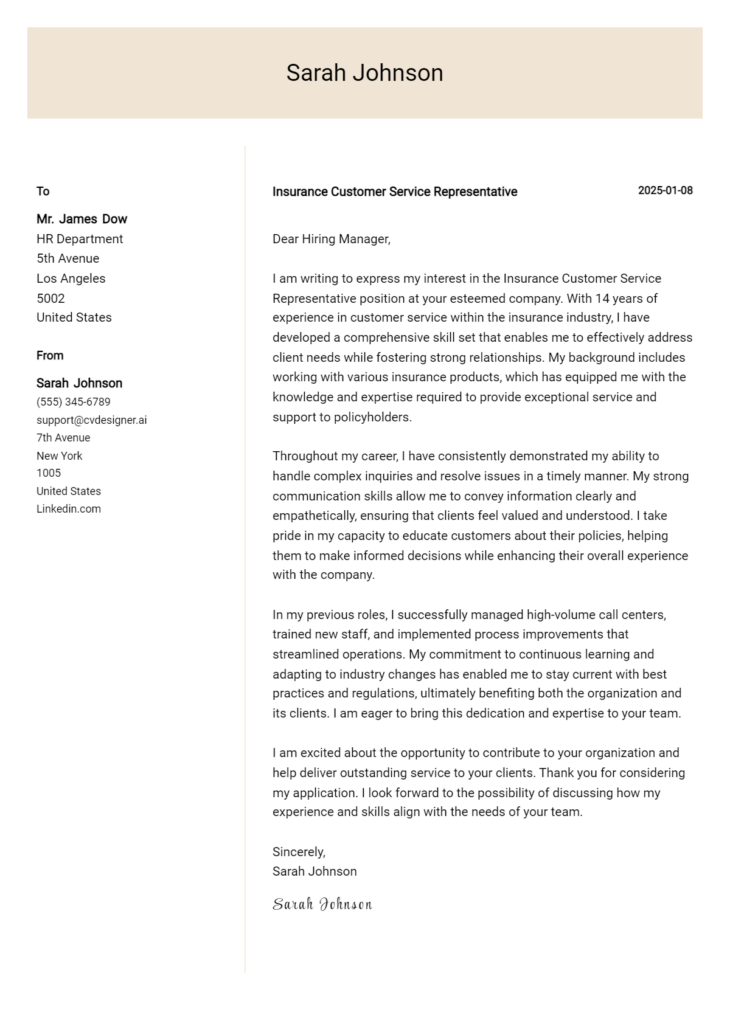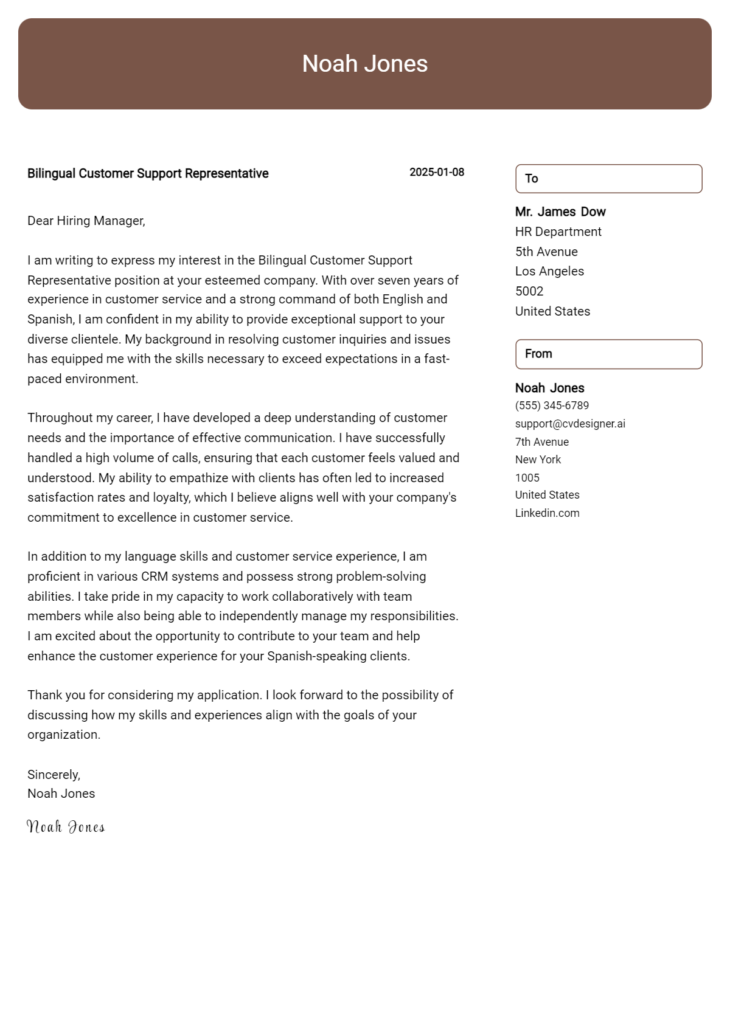Educational Support Specialist Cover Letter Examples
Explore additional Educational Support Specialist cover letter samples and guides and see what works for your level of experience or role.
How to Format a Educational Support Specialist Cover Letter?
Crafting a compelling cover letter is essential for an Educational Support Specialist, as it serves as your first opportunity to connect with potential employers. Proper formatting not only enhances readability but also reflects your organizational skills and commitment to the role. The structure of your cover letter is critical in showcasing your ability to communicate effectively—an essential trait in an educational setting.
In this guide, we'll explore how to format your cover letter, providing insights and examples tailored to the Educational Support Specialist position.
We will focus on the key components of a professional cover letter, including:
- Cover Letter Header
- Cover Letter Greeting
- Cover Letter Introduction
- Cover Letter Body
- Cover Letter Closing
Each section is vital in presenting your qualifications and professionalism. Let’s break down each part to help your cover letter resonate with hiring managers and shine a light on your dedication to supporting students' educational journeys.
Importance of the Cover Letter Header for an Educational Support Specialist
The header of a cover letter is crucial as it sets the tone for the entire document and presents the first impression to potential employers. For an Educational Support Specialist, clarity and professionalism in the header are essential, as they reflect the candidate's attention to detail and organizational skills—qualities that are important in an educational environment. The header should include the applicant's contact information, the date, and the recipient's details, ensuring that all relevant information is easily accessible.
A strong cover letter header demonstrates professionalism and proper formatting, while a weak header may convey carelessness or lack of attention. Below are examples of a strong and a weak cover letter header for an Educational Support Specialist.
Strong Example
Jane Doe 1234 Elm Street Cityville, ST 12345 janedoe@email.com (123) 456-7890 October 1, 2023 Mr. John Smith Hiring Manager ABC School District 5678 Maple Avenue Townsville, ST 67890
Weak Example
jane doe cityville 10/1/23 to whom it may concern
The Importance of the Cover Letter Greeting
A well-crafted cover letter greeting is crucial as it sets the tone for the rest of the letter, establishing a professional and respectful connection with the hiring manager. Addressing the hiring manager directly not only showcases your attention to detail but also adds a personal touch that can make your application stand out. A personalized greeting demonstrates your commitment to the position and the organization, while a generic greeting may come across as lazy or impersonal. To make a strong impression, take the time to research the recipient’s name and title, ensuring you avoid common pitfalls such as "To Whom It May Concern" or "Dear Hiring Manager."
Strong Greeting Example
Dear Ms. Johnson,
Weak Greeting Example
To Whom It May Concern,
The Importance of a Well-Crafted Cover Letter Introduction for an Educational Support Specialist
A compelling cover letter introduction is crucial for any job application, particularly for the role of an Educational Support Specialist. This introduction serves as the first impression for the hiring manager, making it essential to capture their attention immediately. It should express genuine interest in the role while briefly showcasing key skills or achievements that align with the job's requirements. A well-crafted introduction not only sets the tone for the rest of the letter but also demonstrates the applicant's understanding of the position and their potential impact on the educational environment.
Strong Example:
Dear [Hiring Manager's Name], I am excited to apply for the Educational Support Specialist position at [School/Organization Name], where I can leverage my five years of experience in special education and my passion for fostering inclusive learning environments. Having successfully implemented individualized education plans for over 50 students, I am dedicated to empowering each learner to achieve their fullest potential. I am eager to contribute my skills in collaboration and advocacy to support the diverse needs of your student body.
Weak Example:
To Whom It May Concern, I am writing to apply for the Educational Support Specialist job. I have some experience in education and think I would be a good fit. I have worked with students before and have some skills that might be useful.
Purpose of the Cover Letter Body for an Educational Support Specialist
The body of the cover letter for an Educational Support Specialist serves as a crucial platform for candidates to articulate their unique qualifications and experiences that align with the needs of the educational institution. This section allows applicants to highlight specific projects or accomplishments that demonstrate their skills in supporting diverse learners, developing educational resources, and fostering an inclusive learning environment. By showcasing these relevant experiences, candidates can effectively convey their potential value to the organization, illustrating how their contributions can enhance student success and overall program effectiveness.
Strong Example
In my previous role as an Educational Support Specialist at XYZ School, I successfully implemented a new tutoring program that increased student math proficiency by 25% over a six-month period. I collaborated with teachers to identify struggling students and tailored personalized learning plans that incorporated hands-on activities and technology. Additionally, I organized workshops for parents to equip them with strategies to support their children’s learning at home, which fostered a strong community connection and improved overall student engagement. My dedication to creating inclusive learning experiences has resulted in a measurable impact on student outcomes, and I am eager to bring this passion and expertise to your team.
Weak Example
I worked as an Educational Support Specialist where I did a lot of things. I helped students with their homework and sometimes worked with teachers. I think I did a good job, but I don’t have specific numbers or examples to share. I really like working with kids and I believe I would be a good fit for your school.
Importance of the Cover Letter Closing for an Educational Support Specialist
The closing paragraph of a cover letter is a crucial opportunity to leave a lasting impression on the hiring manager. For an Educational Support Specialist, it is essential to succinctly summarize your qualifications, reinforce your enthusiasm for the position, and encourage the reader to take the next steps, such as reviewing your resume or scheduling an interview. A well-crafted closing can convey your professionalism and eagerness, while a weak closing can undermine the strength of your application.
Strong Example
Thank you for considering my application for the Educational Support Specialist position. I am excited about the opportunity to contribute my skills in individualized support and educational strategies to your team. I believe my background in special education and my passion for fostering inclusive learning environments make me a strong fit for this role. I look forward to the possibility of discussing my application further and am eager to provide additional insights during an interview. Please feel free to review my resume for more details on my qualifications.
Weak Example
I appreciate your time in reading my letter. I think I would be okay for the job. You can look at my resume if you want. I'm not really sure when I can meet, but let me know.
These tips will help candidates craft an effective cover letter for an Educational Support Specialist position. A well-written cover letter is crucial for standing out in a competitive job market. It allows you to showcase your technical skills, problem-solving abilities, knowledge of the Software Development Life Cycle (SDLC), teamwork capabilities, and a passion for continuous learning. By emphasizing these qualities, you can demonstrate why you are an excellent fit for the role.
Cover Letter Writing Tips for Educational Support Specialist
Highlight Your Technical Skills
In your cover letter, specifically mention the technical skills that are relevant to the Educational Support Specialist role. This could include proficiency in educational software, data analysis tools, or learning management systems. Providing examples of how you've successfully utilized these skills in previous roles can make your application stand out.Showcase Problem-Solving Abilities
Educational Support Specialists often encounter challenges that require innovative solutions. Use your cover letter to describe a situation where you effectively solved a problem. Detail the steps you took and the positive outcome that resulted. This not only highlights your problem-solving skills but also demonstrates your ability to think critically under pressure.Demonstrate SDLC Knowledge
If applicable, include your understanding of the Software Development Life Cycle (SDLC) in your cover letter. Explain how your knowledge of SDLC principles can enhance educational technology initiatives or improve student learning experiences. This shows your alignment with educational objectives and your technical proficiency.Emphasize Teamwork and Collaboration
Educational environments thrive on collaboration. Share examples of how you have worked effectively in teams, whether with educators, administrators, or other stakeholders. Highlight any specific projects that required teamwork, focusing on your contributions and the successful outcomes achieved through collaboration.Express a Passion for Continuous Learning
The field of education is constantly evolving, so it’s essential to convey your commitment to continuous learning. Mention any professional development courses, certifications, or workshops you’ve attended that relate to the role. This demonstrates your dedication to staying current in educational practices and technologies, making you a valuable asset to any team.
For further assistance in crafting your cover letter, consider utilizing cover letter templates or a cover letter builder to help you organize your thoughts and present your qualifications effectively.
Common Mistakes to Avoid in an Educational Support Specialist Cover Letter
Crafting a compelling cover letter for the position of an Educational Support Specialist is essential to making a positive first impression. Avoiding common mistakes can significantly enhance your chances of landing an interview. Here are some pitfalls to steer clear of:
Generic Content: Failing to tailor your cover letter to the specific job and organization can make it seem impersonal. Research the institution and mention relevant programs or values to show genuine interest.
Too Lengthy or Too Short: A cover letter that is either too long or too short can be off-putting. Aim for a concise format that clearly outlines your qualifications—ideally, one page is sufficient. For tips on structure, refer to this cover letter format.
Neglecting Proofreading: Spelling or grammatical errors can undermine your professionalism. Always proofread your letter or have someone else review it to catch mistakes before submission.
Overly Casual Tone: While it's important to express your personality, maintaining a professional tone is crucial. Avoid slang or overly informal language to ensure your letter reflects your seriousness about the position.
Listing Responsibilities Instead of Achievements: Instead of merely stating your past job duties, highlight specific achievements that demonstrate your skills and impact. Use quantifiable results when possible to strengthen your case.
Ignoring the Employer's Needs: Failing to align your skills with the specific needs of the employer can be a missed opportunity. Carefully read the job description and address how you can meet their requirements.
Not Including a Call to Action: Concluding without a strong call to action can leave your cover letter feeling incomplete. End with a statement that encourages the employer to reach out for further discussion.
For inspiration, check out these cover letter examples to see how these tips can be effectively applied. By avoiding these common mistakes, you can create a standout cover letter that showcases your qualifications for the Educational Support Specialist role.
Cover Letter FAQs for Educational Support Specialist
What should I include in my cover letter for an Educational Support Specialist position?
In your cover letter, it's essential to highlight your relevant experience, skills, and passion for supporting students' educational needs. Start with a strong opening that expresses your enthusiasm for the role and the institution. Include specific examples of your past experiences, such as working with diverse student populations, implementing individualized education plans (IEPs), or collaborating with teachers and parents. Showcase your key skills, such as communication, adaptability, and problem-solving. Finally, convey your commitment to fostering a positive learning environment and your eagerness to contribute to the educational community.
How can I demonstrate my qualifications in my cover letter?
To effectively demonstrate your qualifications, tailor your cover letter to the specific job description. Use keywords and phrases from the job posting to align your skills with the requirements. Include quantifiable achievements, such as helping a certain percentage of students improve their grades or successfully managing a specific number of IEPs. Highlight relevant certifications, training, or coursework that enhances your ability to support students. Additionally, consider sharing a brief narrative about a challenging situation you've handled, showcasing your problem-solving abilities and dedication to student success.
Should I address my cover letter to a specific person?
Yes, addressing your cover letter to a specific individual, such as the hiring manager or the head of the department, can make a positive impression. It shows that you have taken the time to research the organization and are genuinely interested in the position. If you cannot find a name, using a general greeting such as "Dear Hiring Committee" is acceptable, but a personalized salutation is preferred. Make sure to double-check the spelling of the person's name and title to maintain professionalism and attention to detail.
How long should my cover letter be?
Your cover letter should be concise and focused, ideally one page in length. Aim for three to four paragraphs that clearly articulate your interest in the position, your qualifications, and your enthusiasm for contributing to the educational environment. Use clear and direct language, and avoid overly complex sentences that may dilute your message. Remember that hiring managers often review many applications, so keeping your cover letter brief yet impactful will help you stand out in a competitive field.
Build your Cover Letter in minutes
Use an AI-powered cover letter builder and have your letter done in 5 minutes. Just select your template and our software will guide you through the process.

